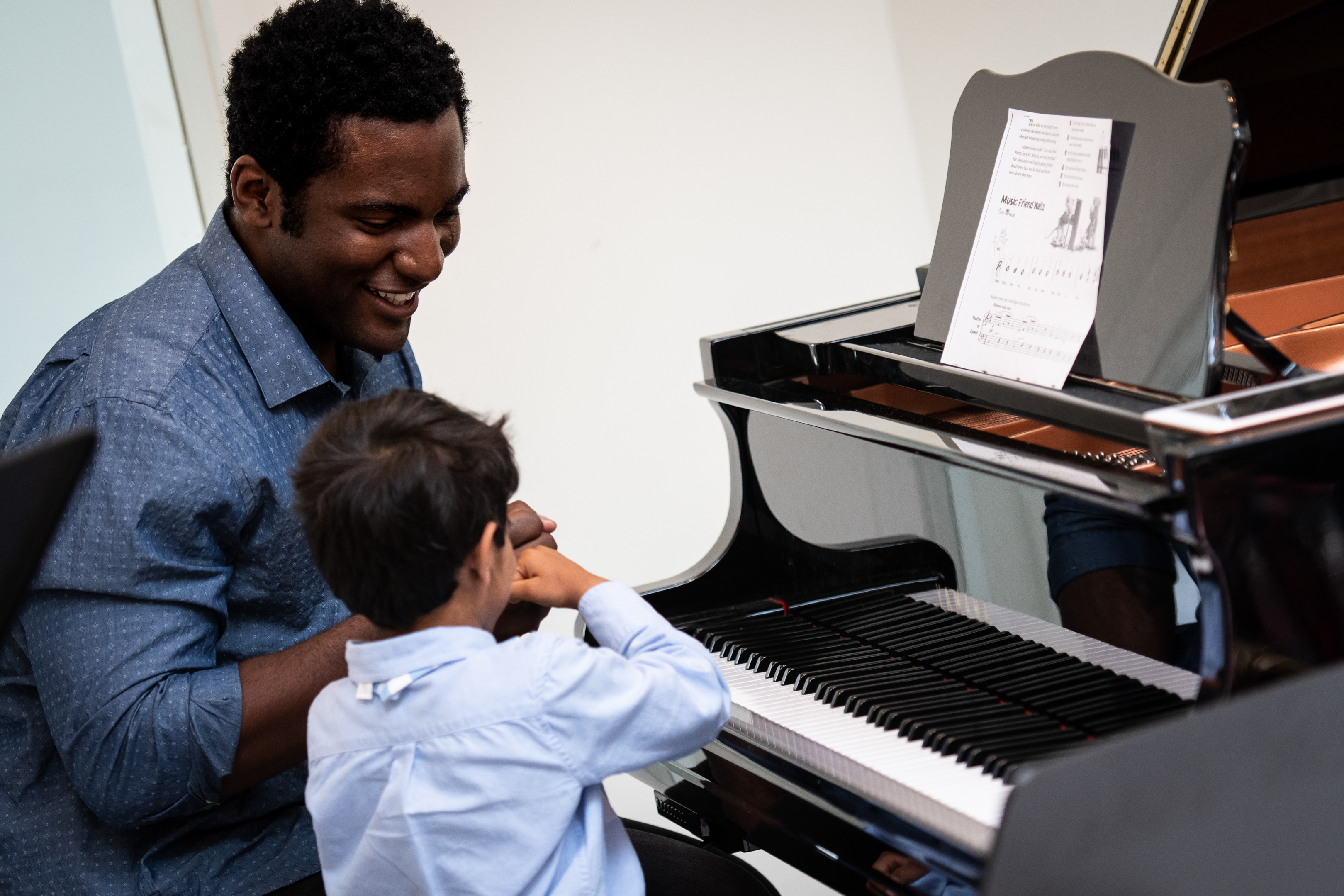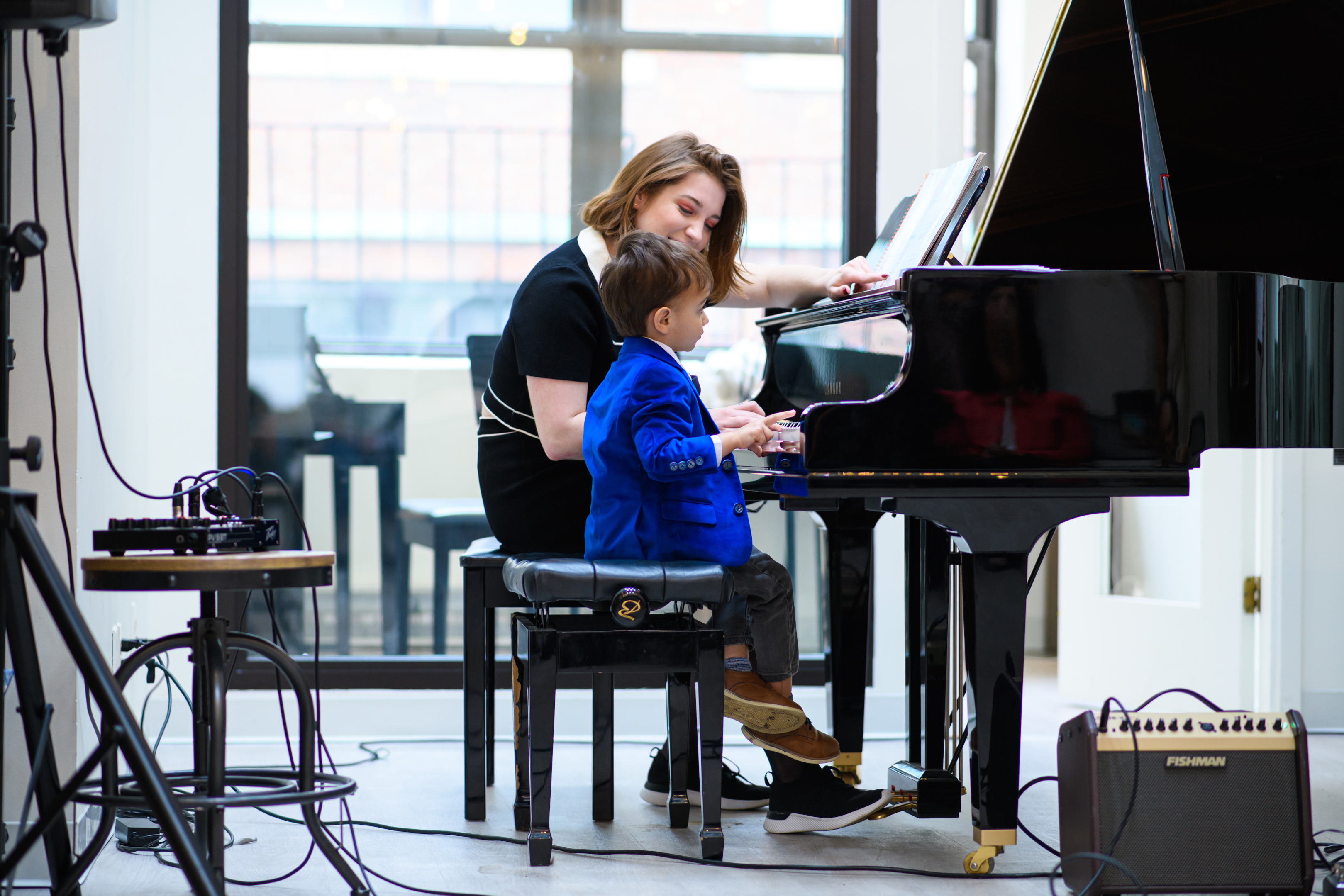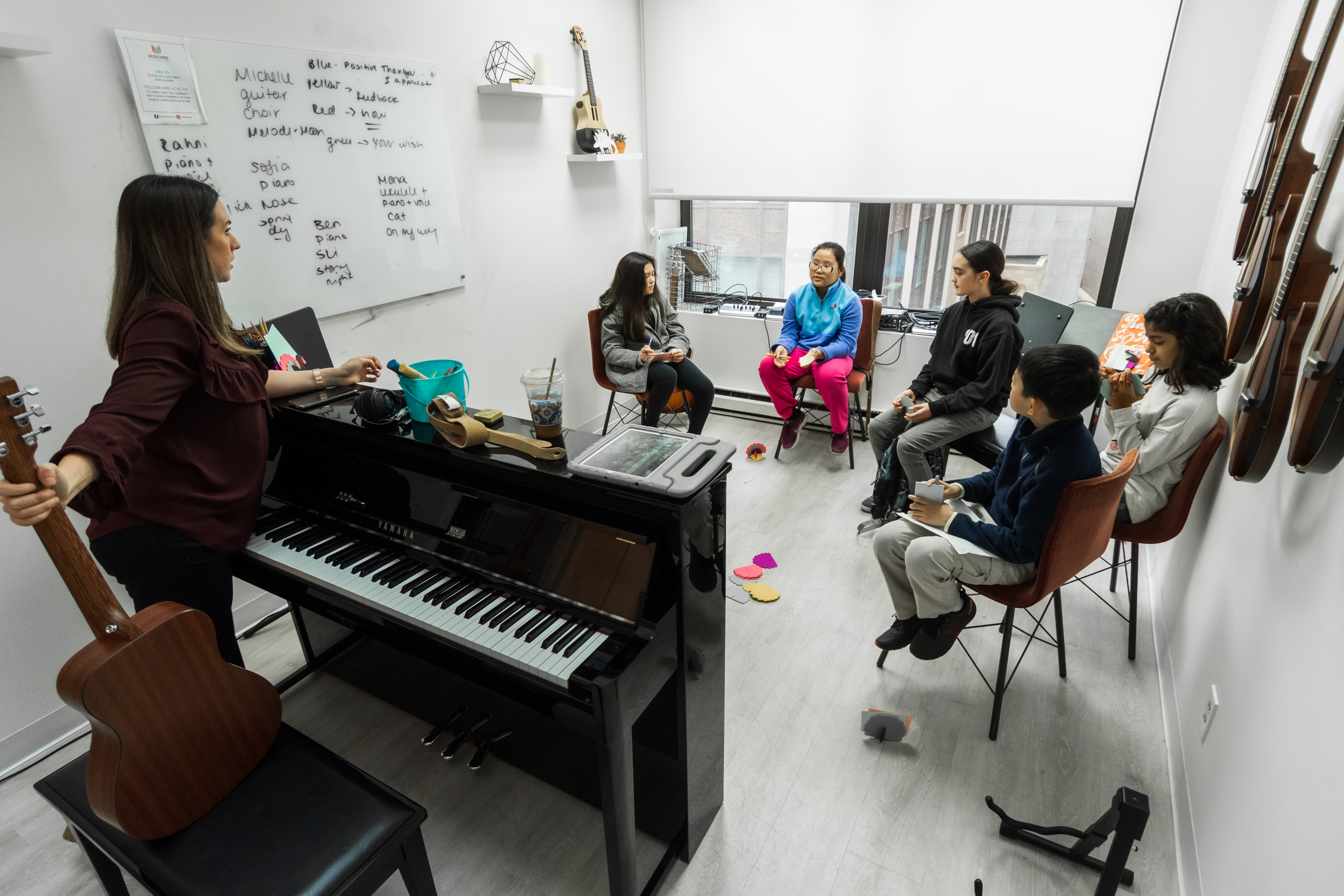Blog
How To Choose The Right Music Teacher For You

Choosing the right music teacher is a crucial step for everyone – whether you’re a hobbyist looking for a creative outlet or a parent looking to help your child develop their musical talents. But how do you find the right teacher?
This article will help you determine what your goals are as a learner, and what to consider when finding the right music instructor for you.
What Are Your Goals For Your Music Lessons?
The first step in finding the best music teacher for you is to understand your own musical goals. Are you a hobbyist looking to have fun playing, or are you interested in a music career and are looking for professional preparation? What genre of music are you looking to play? How much practice time do you think you’ll have? Is there a particular instrument you’re looking to learn on? These are all important questions to ask yourself that will significantly narrow down the search for a music teacher who will be the right fit for you.
For example, a hobbyist will need to be coached more broadly than a student who is looking to go pro, who requires ‘niche’ coaching with focuses like developing proper technique or preparing for a music performance. The learning process for each student is unique in that way, and a great teacher will know how to tailor the learning to fit their needs.
Parents who are looking for music lessons for their child should take into account what level of commitment the child is ready for – between school and their other commitments, will they have time for daily practice on their instrument? While practicing daily is not the most important factor in choosing the best teacher for them, it helps to be as specific as possible with their learning goals before signing your child up for lessons.
Music Teachers Are Not Created Equal
It’s important to remember that there are many differences between music teachers. These include:
Teaching Practices: Some teachers use a more traditional approach to teaching, while others prefer a more contemporary or experimental approach. Teachers usually will coach in the way that they were coached, and while no system is perfect, not every teaching style is right for every student. It’s important to work with a teacher who can adapt the lesson plans for you.
Specialization: Many teachers specialize in a specific instrument or genre, while other teachers have a more general approach and can teach a variety of musical instruments or styles. Both are probably great at what they do, but a general approach would benefit the hobbyist more than the students who aim for high achievement in a specific area.
Teaching Experience: Some music teachers may be more experienced than others, having taught for many years or performing professionally. While we all want to learn under more experienced teachers, it’s essential to differentiate between a teacher who is an experienced musician, and a teacher who has experience teaching – these are not the same skill, and being a great musician does not a great music teacher make!
Qualifications: Music teachers may have different levels of education or certifications in music education or performance. When studying music, students and parents often wonder if they should seek a nationally certified teacher by organizations like MTNA (Music Teachers National Association) and prioritize them over private music teachers, but while MTNA certification is undoubtedly a prestigious credential, good teaching encompasses factors that go beyond a certain qualification.
Personality: Music teachers may have different personalities and teaching styles that may resonate with some students more than others.
Availability: Some music teachers may have more availability than others, making it easier or more difficult to schedule music lessons. For hobbyists or children who don’t have a lot of free time, working with a teacher that has a flexible schedule is preferable.

How We Choose Our Coaches at Musicians Playground
At MP, we pride ourselves on our great teachers. This is because we choose them very carefully through a three-round interview process. It’s not enough for us that the candidates have the required qualifications and have demonstrated competence in the interviews – we also screen them for our MP philosophy to make sure that, in addition to their teaching ability, they share the studio’s values of community building through music, music as a form of wellness, and above all – having fun! We also test each music teacher on whether or not they are adept at teaching hobbyists, as well as students of different age groups.
Once hired, and before they start to teach, the teacher participates in extensive teacher training where they gain practical, effective tools to use in the classroom.
What Makes a Good Music Teacher for Hobbyists?
Understanding and Supporting Your Learning Goals
A good teacher strives to reach a true understanding of their student’s motivations for learning and does their best to support them. Hobbyist musicians engage in music primarily for enjoyment and personal fulfillment – a good music teacher understands this and ensures that they are making lessons fun, focusing on the joy of playing music. They incorporate fun activities, encourage creativity, and help hobbyists choose repertoire that they are interested in. By matching the learning to students’ goals – a teacher can foster a lifelong love of music within their students and keep them motivated to continue playing.
Another example of this is the ongoing pressure to practice. Hobbyists have limited time and may progress more slowly compared to students with more professional goals. A good music teacher for hobbyists knows the balance between teaching new concepts in the classroom and providing manageable practice goals for their out-of-studio time. They offer guidance on effective practice techniques and help hobbyists optimize their practice time, ensuring student progress without pressuring them to put in unrealistic hours.
It’s All About The Students!
In order to best tailor the learning experience, A good music teacher should build rapport with their students and connect to them on a personal level. This is important for both private music teachers and those who teach in groups. By prioritizing learning about the student as a person, the teacher creates a learning environment that encourages student confidence, fosters intrinsic motivation, and ensures a fun time in the music lesson.
A good music teacher for hobbyists also understands that the learning is in the playing – not in the talking. The lesson should be a jam session and the student should play (almost) the entire time. What sets the hobbyist’s teacher apart from other teachers is their ability to keep their explanations minimal.
A Teacher Who Understands Your Learning Style
A music teacher who can identify and cater to a variety of learning styles ensures that their students receive effective and engaging instruction. For example, visual learners benefit from seeing information presented visually. When teaching things like music theory, a teacher may use a whiteboard or interactive software to illustrate concepts like scales, intervals, or chord progressions.
Another example is how auditory learners grasp information best through listening and speaking. A music teacher can cater to auditory learners by playing the music first and then breaking it down, teaching through repetitions or call and response.
A good teacher knows how to identify a student’s learning style (visual, auditory, kinesthetic, logical/mathematical, social, solitary, or verbal) and how to incorporate a range of teaching techniques that align with those learning styles to create a well-rounded and inclusive learning environment. Flexibility and creativity in instructional approaches will ensure that students of all learning styles have a meaningful and enriching musical journey.
A Beginner’s Coach Vs. Niche Coaching – What’s Better?

There are many advantages to learning with music teachers that coach beginners, the biggest of which is their experience with leveling the material and creating progressions that match the student’s pace.
Beginners (and children) need structured instruction that progresses gradually to avoid overwhelming them with complex concepts too soon. A beginner’s music teacher knows how to break down skills into manageable steps, ensuring that beginners grasp each concept before moving on. With a child, this skill is essential as children move fluidly through the different developmental stages – and require different teaching methods at each stage. A niche coach can only work effectively if the musical foundation is already there, and will tend to skip over skills that they deem to be “entry-level” – this isn’t ideal for a hobbyist who needs the focus on the fundamentals, especially if they had previous bad habits on their instrument prior to starting lessons.
Another major advantage of working with a beginner’s coach is the building of a strong musical foundation: By establishing good habits, technique, and musical understanding early on, students are set up for long-term success in their musical pursuits. This strong foundation can help them progress smoothly as they advance and explore more complex musical concepts. for these reasons, if you’re a hobbyist, or a parent looking for a coach for their child, a music teacher that coaches more broadly would be the recommended way to go.
Chemistry Is Key!
Teaching is like dating – you don’t have to commit to the first teacher you study with! Schedule an introductory lesson or two with a teacher you like, and see if their personality and teaching style resonate with you. Learning with a teacher you just don’t click with makes music boring.
Testing The Chemistry
Here are some factors to consider when assessing the chemistry between you and a music teacher:
Communication Style: Pay attention to how you communicate with one another during your initial interactions. Are you comfortable expressing your thoughts and asking questions? Is the teacher responsive and attentive to you?
Teaching Approach: Consider the teaching methods employed by the music teacher. Do they align with your learning preferences and goals? Some students thrive in a structured environment, while others prefer a more flexible and creative approach. Assess whether the teacher’s style resonates with your preferred learning style.
Personal Connection: Chemistry involves good rapport. Do you feel comfortable in the teacher’s presence? Do they show genuine interest in who you are as a person, your aspirations, and your progress?
Mutual Respect: Chemistry between a student and teacher is built on mutual respect. Evaluate whether the teacher demonstrates respect for your ideas and individuality. Likewise, assess whether you respect the teacher’s expertise and guidance.
Emotional Engagement: Does the teacher inspire and motivate you? Do you feel a sense of excitement and enthusiasm for learning? A music teacher who can evoke emotions and ignite your passion for music can greatly enhance the learning experience.
Progress and Growth: Assess your learning at the end of your lessons. Do you feel challenged yet supported in your musical development? Are you seeing improvements in your skills and musical understanding? There’s nothing more frustrating than learning for a long time and feeling like you’re not progressing.
Trust and Support: Evaluate whether the teacher creates a safe and nurturing space for you to take risks and make mistakes. A supportive teacher who believes in your potential can help you overcome challenges and reach new heights.

1… 2… Here we go!
Whether you want to sing or to learn to play a new musical instrument, working with the right music teacher is essential for a fun, effective learning process. There are many considerations to choosing the best teacher to start with, but hopefully, this article helped you understand what kind of learner you are and what is most important for you.
If you liked this blog, we put these out monthly in our newsletter, so consider signing up to our mailing list – that way you can also stay up to date on upcoming events, special promotions, and more content like this. Happy learning!

